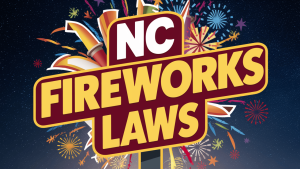As the summer heats up and we’re celebrating the 4th of July, many North Carolinians aren’t all that sure 
Unfortunately, sometimes not knowing the NC fireworks laws ends up with otherwise law-abiding citizens getting charged with a misdemeanor and all that entails.
Whether you’re planning a backyard barbecue or a large community event, it’s helpful to understand the laws governing pyrotechnics in our state.
I’ve seen firsthand how confusion about these regulations can lead to unintended legal troubles – Bill Powers, Criminal Defense Attorney
Let’s break down North Carolina’s fireworks laws to help you celebrate safely and legally.
The General Rule: Most Fireworks are Prohibited
In North Carolina, the general rule is quite strict: it’s unlawful for individuals to manufacture, purchase, sell, transport, possess, receive, advertise, use, handle, exhibit, or discharge most types of pyrotechnics.
This broad prohibition often covers what many people think of as traditional fireworks and includes things like firecrackers, bottle rockets, and cherry bombs.
However, as is the case with many laws, there are exceptions and nuances that can be helpful to understand.
Standard “fireworks” that are typically illegal in North Carolina
- Roman Candles: These are long tubes that shoot colorful balls of fire into the air.
- Bottle Rockets: Small rockets attached to a stick that are fired from bottles.
- Firecrackers: Small explosive devices that produce a loud bang when ignited.
- Sky Rockets: Larger rockets that fly high into the air before exploding.
- Mortars and Artillery Shells: These are fired from tubes and explode high in the air with large, colorful displays.
- M-80s and Cherry Bombs: Powerful firecrackers that are especially dangerous and illegal in all 50 states.
It’s important to note that this list includes items commonly considered “consumer fireworks” in some states (like South Carolina or Tennessee), but which may be prohibited for personal use in North Carolina.
The NC fireworks laws are quite strict, allowing only a limited selection of smaller, less powerful pyrotechnic devices for general use.
Always check current local regulations, as laws can change, and interpretations may vary. 
When in doubt, it’s best to enjoy fireworks at professional, permitted displays rather than risk legal troubles with personal use.
What “Fireworks” are Allowed: Understanding the Exceptions
While North Carolina law is generally restrictive on fireworks, it does allow for some specific exceptions.
These aren’t officially labeled as “safe and sane” in the law, but they represent the types of smaller pyrotechnic devices that are permitted for general use.
According to § 14-414 of North Carolina General Statutes, the following items are exempt from the general prohibition:
- Explosive caps for toy pistols (with limitations on explosive mixture)
- Snake and glow worms
- Smoke devices
- Trick noisemakers like party poppers, string poppers, and snappers
- Wire sparklers (limited to 100 grams of mixture)
- Other small sparkling devices with specific restrictions
It’s important to note that even permitted items should be used with caution and adult supervision.
While they may seem less dangerous than larger fireworks, they can still pose risks if not handled properly.
What happens if they don’t read me my Miranda Rights?
Remember, local ordinances may further restrict the use of “pyrotechnics,” so it’s wise to proceed with caution before purchasing or using any pyrotechnic devices.
The safest approach is to enjoy fireworks at professional, permitted displays rather than attempting to use them yourself.
Professional Displays: When the Big Fireworks are Legal in NC
If you’re dreaming of a sky filled with colorful explosions, don’t despair.
North Carolina does allow for professional fireworks displays under specific conditions. These displays require:
- A licensed display operator
- Written authority from local officials
- Compliance with safety regulations
- Proper insurance coverage
For public exhibitions like concerts, fairs, or holiday celebrations, organizers can obtain permits to use larger fireworks.
However, this process involves significant planning, expertise, and oversight.
The Consequences: What Happens If You Break the Fireworks Law
Violating North Carolina’s fireworks laws isn’t just dangerous—it’s also illegal.
Most violations are considered Class 2 misdemeanors, which can result in fines and even jail time in certain circumstances.
Who decides if you’ll be charged?
If the violation involves an indoor exhibition, it becomes a more serious Class 1 misdemeanor.
The legal consequences, combined with the potential for injury or property damage, make it important to follow the law carefully.
Staying Safe and Legal: Tips for Celebrating the 4th of July Responsibly
Even when using legal pyrotechnics, safety should be your top priority.
Here are some tips to help make your celebrations remain fun and incident-free:
- Only use approved “safe and sane” fireworks
- Always have adult supervision for children
- Keep water nearby for emergencies
- Never try to relight “dud” fireworks
- Dispose of used fireworks safely
- Consider attending professional displays instead of using your own fireworks
Remember, the safest way to enjoy fireworks is to attend a professional, permitted display.
You’ll get all the excitement without the legal risks or safety concerns.
Why are some charges dismissed?
Understanding and following North Carolina’s fireworks laws helps ensure that your celebrations are both festive and legal.
By sticking to approved items, prioritizing safety, and knowing when to leave it to the professionals, you can enjoy the sparkle and excitement of fireworks without risking legal trouble.
If you have any questions about the legality of specific fireworks or displays, we think it best to err on the side of caution.
It also doesn’t hurt to consult with a legal professional.
Stay safe, have fun, and enjoy your celebrations responsibly!
Frequently Asked Questions About Fireworks in North Carolina
To help clarify some common questions about fireworks in our state, let’s address some frequently asked questions:
Can I buy fireworks in another state and bring them back to North Carolina?
A: No, this is not legal. North Carolina law prohibits the transportation of fireworks into the state, even if they were purchased legally elsewhere. Bringing fireworks across state lines could result in legal consequences.
Are there any exceptions for holidays like the Fourth of July?
A: While the Fourth of July is a popular time for fireworks, North Carolina doesn’t have special exceptions for holidays. The same rules apply year-round. However, you’re more likely to find permitted professional displays during major holidays.
Can I use fireworks on private property if I have the owner’s permission?
A: The location doesn’t change the legality of fireworks in North Carolina. Even on private property with the owner’s permission, it’s still illegal to use fireworks that aren’t listed within the NC fireworks laws.
What about sparklers? I’ve seen them at birthday parties.
A: Wire sparklers are generally legal in North Carolina, but with limitations. While popular, remember that sparklers can reach very high temperatures and should be used with caution, especially around children.
I’m planning a wedding and want to have a fireworks display. Is this possible?
A: Yes, but it requires planning and permits. You’ll need to hire a licensed pyrotechnics operator and obtain the necessary permissions from local authorities. It’s best to start this process well in advance of your event date.
Are there any age restrictions on buying or using legal fireworks?
A: Yes, North Carolina law prohibits the sale of any pyrotechnics to persons under the age of 16. This includes even items that are legal for general use.
What should I do if I see someone using illegal fireworks in my neighborhood?
A: If you’re concerned about illegal pyrotechnics use, especially if it poses a safety risk, you should contact local law enforcement. Don’t confront the individuals yourself, as this could lead to dangerous situations.
Can schools or universities use fireworks for special events?
A: The law does provide some specific exceptions for certain universities. For example, UNC Chapel Hill, NC State, and UNC School of the Arts have special provisions for fireworks displays on their properties. However, these still require proper authorization and safety measures.
What if I want to use fireworks for a film production?
A: There is a provision in the law for using pyrotechnics as special effects in film productions. However, this requires that the set be closed to the public or separated from the public by at least 500 feet. It’s crucial to work with licensed professionals and obtain any necessary permits.
Are there any plans to change the fireworks laws in North Carolina?
A: As of now, there are no major changes on the horizon for North Carolina’s fireworks laws. However, laws can change, and it’s always a good idea to stay informed about current regulations, especially before planning any events involving pyrotechnics.
Remember, while these FAQs cover many common situations, they don’t address every possible scenario. If you have specific questions about your situation, it’s advisable to consult with a legal professional.
By understanding and following these laws, we can all work together to ensure that our celebrations are safe, enjoyable, and within the bounds of the law.
Whether you’re enjoying a small backyard gathering with legal sparklers or attending a grand professional display, the key is to prioritize safety and respect for our community’s regulations.
